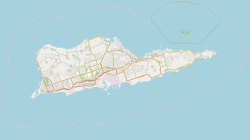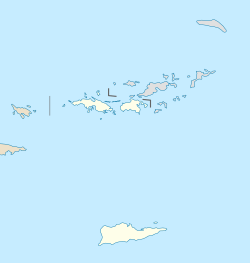Fort Frederik facts for kids
|
Fort Frederik
|
|
|
U.S. Historic district
Contributing property |
|

Fort Frederik
|
|
| Location | North of junction of Lagoon Road and King Street, Frederiksted, United States Virgin Islands |
|---|---|
| Area | 2 acres (8,100 m2) |
| Built | 1752 |
| Architectural style | Colonial |
| Part of | Frederiksted Historic District (ID76001853) |
| NRHP reference No. | 96001073 (NRHP) 97001269 (NHL) |
Quick facts for kids Significant dates |
|
| Added to NRHP | October 8, 1996 |
| Designated NHL | September 25, 1997 |
| Designated CP | August 9, 1976 |
Fort Frederik, also known as Frederiksfort, is a very important historical site in Frederiksted, United States Virgin Islands. It's recognized as a National Historic Landmark in the U.S. This old fort was built a long time ago, between 1752 and 1760, by the country of Denmark-Norway.
The main reason for building Fort Frederik was to protect the busy port of Frederiksted. This port had deep water, which was great for ships. The fort also helped to keep pirates away and made sure that ships paid their taxes before leaving. You can easily spot it because its walls are painted red and white, which is different from Fort Christiansværn on the other side of the island, which is yellow and white. Fort Frederik is located at the northern end of Frederiksted, in St. Croix.
Contents
Why Fort Frederik Was Built
Back in the 1700s, it was very important for towns to have a way to collect taxes from ships. If there wasn't a strong defense, ships might just leave without paying what they owed. So, cannons were needed to guard the harbor. Fort Frederik was built with these cannons to make sure ships followed the rules and paid their dues.
A Special Salute to America
Something really cool happened at Fort Frederik in 1776. The fort fired the very first salute from a foreign land to the newly formed United States of America! An American ship had raised the American flag in the port of Frederiksted. Even though Denmark-Norway was supposed to be neutral, the islands had been friendly with the British colonists in America. So, the salute was a sign of friendship and respect for the new nation.
Freedom for Enslaved People
Fort Frederik played a huge role in a very important moment in history. On July 3, 1848, the Danish Governor-General, Peter von Scholten, declared that all enslaved people in the Danish islands were free. This happened right from this fort!
Before this, a brave leader named John Gottliff (also known as Moses Gotlieb or General Buddhoe) led about 8,000 enslaved people on a march to Frederiksted. At that time, there were 17,000 enslaved people and 5,000 free black people living on St. Croix. Governor von Scholten's announcement from Fort Frederik changed their lives forever.
Visiting Fort Frederik Today
Today, Fort Frederik is a museum and an art gallery. It's a great place to learn about the history of the Virgin Islands. You can visit the fort on weekdays from 8:30 AM to 4:00 PM, and on Saturdays from 1:00 PM to 4:00 PM. The admission fee was $3 in 2015.
Fort Frederik's Historical Recognition
Fort Frederik is part of the Frederiksted Historic District, which was recognized in 1976. Later, in 1996, it was listed on the National Register of Historic Places all by itself. Then, in 1997, it was given the even higher honor of being named a National Historic Landmark. These titles show how important the fort is to the history of the United States.
Emancipation Park and Clock Tower
Right in front of Fort Frederik, near the waterfront, you'll find the Eliza James-McBean Clock Tower and Emancipation Park. This park is a special place that honors the history of the island. It has statues of important people from the Virgin Islands.
The park's paths wind through many large mahogany trees and sweet-smelling flowers. It remembers General Buddhoe, the leader of the slave revolt, and Governor Peter von Scholten's 1848 declaration that freed the enslaved people. The park has benches and a small gazebo, and in 2014, it hosted "Jazz in the Park" on the third Friday of every month.
Images for kids
See also
- List of United States National Historic Landmarks in United States commonwealths and territories, associated states, and foreign states
- National Register of Historic Places listings in the United States Virgin Islands






















